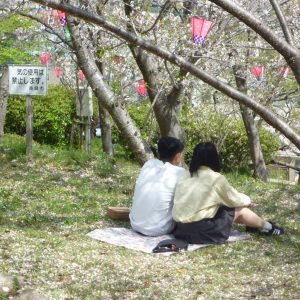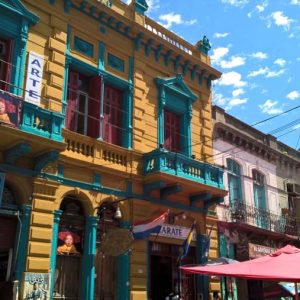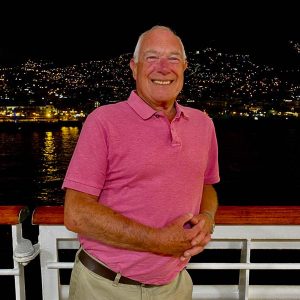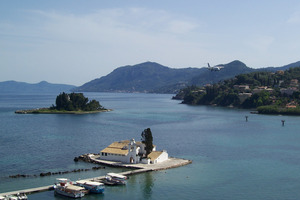 I’m in the middle of “the lull” – that time of the year when travel plans are maturing, but no actual travel is in immediate prospect. A time to recall past trips and the incidents and encounters that make them memorable.
I’m in the middle of “the lull” – that time of the year when travel plans are maturing, but no actual travel is in immediate prospect. A time to recall past trips and the incidents and encounters that make them memorable.
A visit to Corfu springs to mind. The first thing that went wrong was the decision of the organisers to mix travel writers with travel agents. It never works, for we have different priorities and agendas, and unite only at the bar or in the restaurant – mainly to argue.
On our second evening we gathered in one of the large hotels for a folklore performance. I have firm thoughts about folklore performances with which I shall not burden you. Suffice it to say that I have witnessed more than my fair share.
This particular event consisted mainly of Greek girls prancing around, swishing their multi-layered petticoats and waving large handkerchiefs whilst Greek chaps – most of whom were named Spiro for religious reasons – tried to whisk them off their feet. As the girls were fairly hefty, the whisking was largely unsuccessful.
What set this performance apart, however, was a tiny lady named Madam Aspioti (MBE) who appeared on stage sporadically to tell us what was coming next. Educated at Cheltenham Ladies College, she said things like: “The costumes are of Byzantoiyn desoiyn …”
She introduced one song by explaining that the singer was supposed to be a shepherd tending his flock on the hillside above the village. The lyric, she explained, translated as: “My love has eyes for another, but I shall not despair for I smell octopus and rice.”
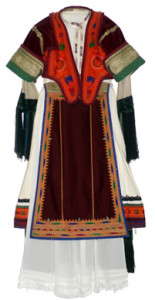 Understandably intrigued, we buttonholed her in the bar after the performance, demanding an explanation. She told us that octopus and rice was the traditional dish eaten at the feast to celebrate a betrothal.
Understandably intrigued, we buttonholed her in the bar after the performance, demanding an explanation. She told us that octopus and rice was the traditional dish eaten at the feast to celebrate a betrothal.
“You mean to say,” declared Arthur, “that this chap knows his girlfriend loves somebody else, but he’s going through with the betrothal nonetheless?”
When Madam Aspioti (MBE) nodded, Arthur looked grim. “Madam,” he said, “that is no basis for a happy marriage.”
The following day we hired a car and headed for the north east corner of the island which was then controlled by the military and out of bounds, because of its proximity to Albania.
David and I shared the driving. Arthur sat happily in the back seat, “helping” with the navigation. After lunch, however, he dozed off.
We headed further into the forbidden zone until we came to a roadblock and a couple of rifle toting soldiers. They were displeased to see us and shouted a lot. We tried to convince them we were stupid English tourists who had got lost (not difficult, given the circumstances). They spoke no English, we spoke no Greek. It was impasse until a young lieutenant showed up. His English was fairly good, and he was responding nicely to our apologies when Arthur woke up.
Taking in the situation at a glance, he leaned forward and said: “Make out we’re just ordinary holiday makers. For goodness sake don’t let on we’re JOURNALISTS.”
It took an awfully long time to get the subsequent situation sorted out.
We spent a few more days racing around Corfu with the travel agents, “inspecting” too many hotels and meeting too many coach operators, restaurant owners and the like, before deciding it was time to break away again.
So we hired another car and headed south, planning to go as far as possible in a single day.
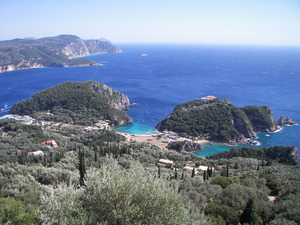 Back then the region beyond Messonghi was undeveloped. The road was not good, our hire car was temperamental, the journey something of an adventure. Around midday we stopped for coffee and to stretch our legs, then pressed on to a spot on the coast, far below Perivolion.
Back then the region beyond Messonghi was undeveloped. The road was not good, our hire car was temperamental, the journey something of an adventure. Around midday we stopped for coffee and to stretch our legs, then pressed on to a spot on the coast, far below Perivolion.
In a scrubby, desolate landscape, on the edge of a small beach, was a taverna. No other building was in sight, so, for better or worse, this was where we would eat before heading back.
As we approached, a man appeared in the doorway at the back of the building, shading his eyes from the sun and calling out to us. It was not a greeting but a question, to judge from the inflexion of his voice. We got close enough for him to realise we were not the people he was expecting.
As soon as he learned we were English he addressed us in that language. A former merchant seaman, he had learned the lingua franca of the professional traveller. On retirement, he had sunk his savings into the taverna, hoping for success and profit when the tourist tide flowed south.
A few minutes after our arrival another car pulled up and two men and a woman got out. One man was a doctor, the woman a midwife. In a room above the restaurant the owner’s young wife was about to produce their first child. He was, he acknowledged, a little old to be a new father, but hoped he would be up to the task.
We spent the next few hours helping him get through the experience. This help consisted mainly of drinking a lot of rough red wine and encouraging him to do the same. He had no inclination to cook so Arthur, who was pretty handy in the saucepan department, headed into the kitchen and produced a very good meal, given the circumstances.
At around nine p.m. we trooped upstairs to the bedroom and raised our thick green tumblers in a special toast to this lovely man, his pretty wife and their brand-new daughter.
Then we drove north. Very, very carefully.
For villa holidays to Corfu and the Greek Islands, Silver Travel Advisor recommends Sunvil and CV Villas

